The French president suggested Putin’s real goal was not to conquer Ukraine but to reforge relations with NATO and the EU.

PARIS — French President Emmanuel Macron is optimistic he can secure a de-escalation over Ukraine when he travels to Moscow to meet his Russian counterpart Vladimir Putin on Monday, but hinted that Western countries could have to make concessions to the Kremlin.
His bullish prognosis of a diplomatic compromise will trigger alarm bells among those who advocate a more hawkish line on Russia, particularly in Central and Eastern European capitals that fear Russian aggression. In an interview with the weekly Journal du Dimanche before his departure, Macron not only downplayed fears that Putin’s real strategic ambition was to occupy Ukraine but also extended an olive branch to Russia by saying he understood Moscow’s need to defend its security interests.
“The intensity of the dialogue we have had with Russia and this visit to Moscow are likely to prevent [a military operation] from happening. Then we will discuss the terms of de-escalation,” he told the JDD. “I have always been in a deep dialogue with President Putin and our responsibility is to build historic solutions.”
Putin has massed some 130,000 troops on Ukraine’s borders inside Russia and Belarus, sparking fears of an imminent invasion.
Macron argued, however, that conquest was not Putin’s ultimate goal. “The geopolitical objective of Russia today is clearly not Ukraine, but to clarify the rules of cohabitation with NATO and the EU,” he said.
Russia is making numerous demands, including that NATO commit not to expand, particularly eastwards into Ukraine, and to keep its military infrastructure where it was in 1997. Many NATO members are dismissing Russia’s wish list out of hand, and nations including the U.S., Britain, Poland and Turkey are arming Kyiv in an attempt to deter Putin from crossing the border.
Macron, however, said Russia was within its rights to seek to negotiate security guarantees. “The security and sovereignty of Ukraine or any other European state cannot be a subject for compromise, while it is also legitimate for Russia to pose the question of its own security.”
Striking a deal, though, could mean giving something up. “We have to be very realistic. We will not obtain unilateral moves, but it is essential to avoid a deterioration of the situation before building mechanisms and reciprocal gestures of trust,” he argued.
“We must protect our European brothers by proposing a new balance capable of preserving their sovereignty and peace. This must be done while respecting Russia and understanding the contemporary traumas of this great people and great nation,” the French president said.
After meeting Putin on Monday, Macron will travel to Kyiv the following day to speak with Ukrainian President Volodymyr Zelenskiy.
The French head of state’s trip comes as NATO Secretary-General Jens Stoltenberg called the Russian military deployment the “biggest since Cold War.” Earlier this week, Joe Biden ordered the deployment of around 3,000 U.S. troops to Poland, Germany and Romania.
Since Macron was elected in 2017, he has kept up a dialogue with Putin — even though his first presidential campaign was reportedly targeted by Russian-backed hackers. The French president’s strategy — sometimes called “naive,” as the president’s own aide on Russia conceded — has yet to yield a strategic breakthrough.
Ahead of Monday’s trip, the French president and his Russian counterpart have spoken on the phone multiple times in the past few days, and Putin complained that Western nations had refused to listen to Russia’s core demands.



